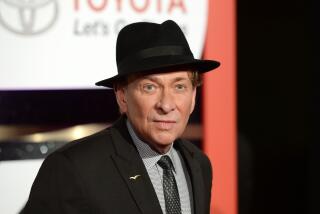Callaway’s Passing Marks the Death of a Salesman
- Share via
Here is all you needed to know about Ely Callaway: Bobby Jones was a distant cousin.
Well, maybe that’s not all you had to know about Callaway, but it might help to establish his pedigree, to provide the proper historical foundation.
Callaway never once placed himself anywhere close to Jones’ category as a golfer. But then Jones, as good as he was, probably couldn’t have kept up with Callaway in the talking department. If Jones was the prototype of the Golfer, then Ely was the prototype of the Salesman.
Callaway was so good, he could have sold ties to Jones . . . or grass to a greenskeeper . . . or roundness to a ball . . . or yellow to the sun.
What Callaway really enjoyed, though, was selling golf clubs to the masses. Sure, he had dozens of pros out there playing on their tours, swinging their Big Berthas and X-14s and Steelheads and Hawk Eye VFTs, but he got his biggest kicks trying to make the game more fun for the average player.
It was pure genius. Callaway sold the sizzle and the steak.
His philosophy was a painfully simple one. He once said, “Develop a product that’s pleasing and demonstrably different and then merchandise the hell out of it.”
It was as if Callaway spent his whole life to reach that point. He became a second lieutenant in the Army Reserve by taking a 29-day correspondence course. He ran Burlington Industries to the top of the textile market. He turned 150 acres of arid ranchland in Temecula into a vineyard and Callaway wine became a staple in the marketplace.
So you see, the golf club gig was only the most recent on his business cards. When they called for new business at Callaway’s board meetings, the response probably took all day and half the night.
If you’re interested how Callaway fared, just check the score book:
* Army Reserve--We won World War II, didn’t we?
* Burlington--He was the Top Coat.
* The wine business--At Queen Elizabeth’s bicentennial tour in 1976, a Callaway Riesling was the only wine served at her luncheon at the Waldorf Astoria.
* Golf clubs--He was the most successful club maker in history.
There is a trend here, you see. But there was always more to Callaway than just his business.
If Callaway’s golf clubs had hard heads, the innovator himself had a soft heart. Callaway signed John Daly to an endorsement deal and paid off his gambling debts. When Paul Azinger couldn’t play for a year while undergoing chemotherapy and radiation for cancer, Callaway paid him his endorsement income in full. A large donation by Callaway to the American Cancer Society was made in Azinger’s name.
Callaway also donated nearly $6 million in stock to Emory University, his alma mater in Atlanta, to build a physics building.
Ely Callaway’s presence was as imposing as his personality. When he walked into a room, he seemed, automatically, the smartest guy there. Many you meet have the attention span of a moth but Callaway always gave visitors his complete attention.
Manners meant something to him. So did the dessert cart and the wine list. Pity upon you if you ordered a bad Chardonnay.
His sense of style was inescapable, sort of cultured Georgian with a wry twist.
He was in his glory when he received an award from the California Golf Writers Assn. in February at Pebble Beach. Wearing a red turtleneck and windowpane pattern jacket, Callaway flew in on his private jet with an entourage that included the woman who walks his dog, had a quick Chardonnay or two, delivered the shortest and funniest speech of the night, then hopped back on the jet and took off in the blackness for Carlsbad.
Callaway held court, one last time as it turns out, on the veranda of the clubhouse of Augusta National at the Masters in April. He was wearing the same jacket he’d worn at Pebble Beach. He was not making a fashion statement, at least not the normal kind.
“Hell, I just like the jacket,” he said.
There aren’t many originals out there anymore and now there is one fewer. Ely Callaway died early Thursday at 82, preventing him from starting in on a fourth career change and becoming a big success all over again.
Once, Callaway was asked what he thought would have happened if Bobby Jones had been able to play with one of those Big Berthas.
Callaway laughed.
“We might have made him perfect,” he said.
Chances are they’re testing one on the driving range right now.
*
RELATED STORY
Big Impact: Callaway’s oversized drivers revolutionized golf. A1
More to Read
Go beyond the scoreboard
Get the latest on L.A.'s teams in the daily Sports Report newsletter.
You may occasionally receive promotional content from the Los Angeles Times.










